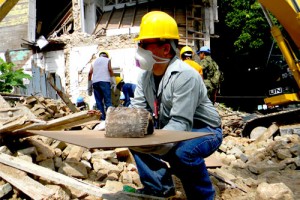The Fifth International Course on First Aid to Cultural Heritage in Times of Crisis Starts
 “I would like to prepare for recovery and reconstruction of Mosul’s cultural heritage,” says Layla Salih, an Iraqi participant of the Fifth International Course on First Aid to Cultural Heritage in Times of Crisis (FAC) which opened today at the Smithsonian Castle, Washington DC, USA. Offered within the framework of ICCROM’s multi-partner programme on Disaster Risk Management, the FAC course is aimed at enhancing national, regional and local capacities for protecting cultural heritage during complex and protracted crises.
“I would like to prepare for recovery and reconstruction of Mosul’s cultural heritage,” says Layla Salih, an Iraqi participant of the Fifth International Course on First Aid to Cultural Heritage in Times of Crisis (FAC) which opened today at the Smithsonian Castle, Washington DC, USA. Offered within the framework of ICCROM’s multi-partner programme on Disaster Risk Management, the FAC course is aimed at enhancing national, regional and local capacities for protecting cultural heritage during complex and protracted crises.
Complex emergencies have multiple causes and are characterised by extensive losses, security risks, political and civil disturbances, and hindrances to humanitarian assistance. Such emergencies require coordinated international or national responses which go well beyond the mandate or capacity of any single agency.
Protecting cultural heritage under these circumstances is extremely challenging. Nonetheless, affected communities strive to protect their cultural heritage amidst the turmoil and anguish, as this heritage provides hope, a connection with the past, and a sense of identity.
The FAC training emphasizes that all actions taken to secure and recover cultural heritage should closely align with the humanitarian principles of humanity, neutrality, impartiality and independence. In order to support this idea in actual practice, ICCROM has identified a set of guiding principles and a framework of actions that closely follow those prescribed for the humanitarian response (see framework document).
On the occasion of the course opening ICCROM’s Director-General, Dr Stefano De Caro, commented as follows: “ICCROM has been involved in the First Aid to Cultural Heritage course for a decade, together with valued partner organizations such as the Smithsonian Institution. It is a complex field, and our own experience shows to what extent ICCROM will be needed to consolidate this kind of training into an established discipline and practice.”
Dr Richard Kurin, Acting Provost and Under Secretary for Museums and Research at the Smithsonian Institution, has additionally stated: “We’re very proud of our collaboration with ICCROM on the First Aid for Cultural Heritage in Crisis workshops over the years. It’s a natural extension of the Smithsonian’s Cultural Rescue Initiative and we look forward to sharing our facilities and staff expertise with our international colleagues in the coming month.”
Post-training participants are invited to submit proposals to carry out projects in their respective countries. The short-listed proposals receive seed grants from the Cultural Emergency Response Programme of the Prince Claus Fund, the Netherlands. The aim is to improve emergency preparedness and response for cultural heritage while putting people at the centre of cultural first aid globally. Since the course’s inception, participants have carried out over 40 workshops in 17 countries.
The five-week FAC 2016 course is being organized in partnership with the Cultural Rescue Initiative of the Smithsonian Institution, the Smithsonian’s complex of museums and galleries, and other national institutions in the United States. These include the University of Pennsylvania’s Cultural Heritage Center, the National Parks Service (NPS), the National Archives and Records Administration (NARA), the United States Red Cross, the National Guard and the US Department of State. ICCROM-ATHAR, the Prince Claus Fund and UNESCO Netherlands have also extended their cooperation in carrying out the course.
The 21 participants of the course are drawn from 18 countries. Many of them have first-hand experience of protecting cultural heritage in emergency situations. All are interested in providing first response to protect cultural heritage during complex and multi-layered emergencies.
Member States Represented: Albania, Canada, Chile, Egypt, Georgia, India, Iraq, Italy, Malawi, Nepal, Netherlands, New Zealand, Nigeria, Norway, Qatar, Seychelles, Spain, Sri Lanka, Switzerland, Syria, Ukraine, United Arab Emirates, United States, Zimbabwe
See also
- FAC 2016 course description
- FAC course announcement
- Disaster Risk Management
- FAC framework document
- First aid to cultural heritage during complex emergencies - Infographics
- First aid to cultural heritage during complex emergencies - Poster


